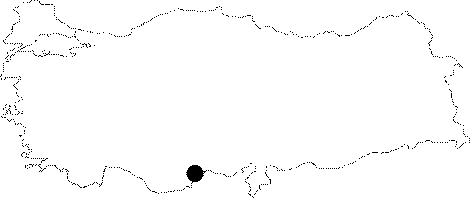|
©The Archaeological Settlements of Turkey - TAY Project
|
|
|
|
|
|
Elvanli / Tömükkale |
|
|
For site maps and drawings please click on the picture...  |
For photographs please click on the photo...  |
|
Type:
|
Mound |
|
Altitude:
|
160 m |
|
Region:
|
Mediterranean |
|
Province:
|
Mersin |
|
District:
|
Erdemli |
|
Village:
|
Tömük |
|
Investigation Method:
|
Survey |
|
Period:
|
Ceramic |
|
|
|
 |
|
| Location: This site lies southwest of the city of Mersin; west of the town of Tömük (Elvanli); and south of the Silifke-Mersin highway. |
| Geography and Environment: This mound; which lies in the Elvanli Plain; is 10 m high and has a 150 m diameter. There are no nearby water sources. The remains of fortification on the northeastern side of the mound suggest that the mound was used as a fortress in the later periods. These ruins account for the name Tömükkale; another name for this mound; which literally means "Fort Tömük". Mellaart; on the other hand; refers to this site as Elvanli Höyük; after the plain it lies in. |
| History: |
| Research and Excavation: The site was researched in 1951 by J. Mellaart and in 1963 by D.H. French. It takes place in the registered archaeological sites list prepared by Ministry of Culture and Tourism. |
| Stratigraphy: The site was inhabited from Neolithic-Early Chalcolithic times to the Islamic Period. |
| Small Finds: Pottery: In his survey J. Mellaart notes that he came across ceramics resembling Mersin Yumuktepe Neolithic types [Mellaart 1958a:91]. Chipped Stone: Mellaart believes that the chipped stone tools show close affinities with Ilicapinar/Çukurkent Industry. Obsidian points were also found. |
| Remains: |
| Interpretation and Dating: The ceramics collected at Elvanli; Tömük Höyük during surface surveys show close affinity with the ones from Mersin Yumuktepe. French; on the other hand; is sceptical about the resemblance of these ware types [Frenh 1965c:186]. In ASPRO the site has been placed into the fifth phase (uncalibrated dates for this phase are 8;000-7;000 BP). |